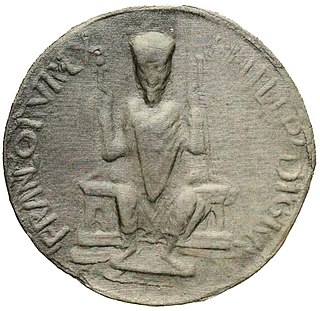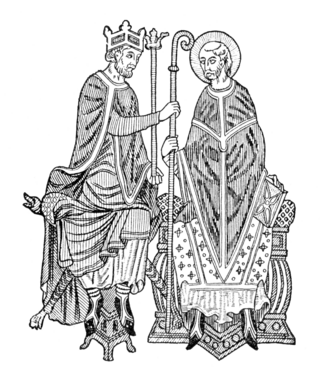Related Research Articles

The pope is the bishop of Rome and the visible head of the worldwide Catholic Church. He is also known as the supreme pontiff, Roman pontiff or sovereign pontiff. From the eighth century until 1870, the pope was the sovereign or head of state of the Papal States, and since 1929, of the much smaller Vatican City State. The current pope is Francis, who was elected on 13 March 2013.

Pope Alexander III, born Roland, was head of the Catholic Church and ruler of the Papal States from 7 September 1159 until his death in 1181.

Pope Urban II, otherwise known as Odo of Châtillon or Otho de Lagery, was the head of the Catholic Church and ruler of the Papal States from 12 March 1088 to his death. He is best known for convening the Council of Clermont which ignited the series of Christian military expeditions known as the Crusades.

Philip I, called the Amorous, was King of the Franks from 1060 to 1108. His reign, like that of most of the early Capetians, was extraordinarily long for the time. The monarchy began a modest recovery from the low it had reached during the reign of his father, Henry I, and he added the Vexin region and the viscountcy of Bourges to his royal domaine.

The Investiture Controversy or Investiture Contest was a conflict between the Church and the state in medieval Europe over the ability to choose and install bishops (investiture) and abbots of monasteries and the pope himself. A series of popes in the 11th and 12th centuries undercut the power of the Holy Roman Emperor and other European monarchies, and the controversy led to nearly 50 years of conflict.

The Council of Clermont was a mixed synod of ecclesiastics and laymen of the Catholic Church, called by Pope Urban II and held from 17 to 27 November 1095 at Clermont, Auvergne, at the time part of the Duchy of Aquitaine.

Renaissance humanism is a worldview centered on the nature and importance of humanity that emerged from the study of Classical antiquity.
The Council of Piacenza was a mixed synod of ecclesiastics and laymen of the Roman Catholic Church, which took place from March 1 to March 7, 1095, at Piacenza.

Pedro Martínez de Luna y Pérez de Gotor, known as el Papa Luna(lit. 'the Moon Pope') or Pope Luna, was an Aragonese nobleman who was christened antipope Benedict XIII during the Western Schism.

The Decretum Gratiani, also known as the Concordia discordantium canonum or Concordantia discordantium canonum or simply as the Decretum, is a collection of canon law compiled and written in the 12th century as a legal textbook by the jurist known as Gratian. It forms the first part of the collection of six legal texts, which together became known as the Corpus Juris Canonici. It was used as the main source of law by canonists of the Roman Catholic Church until the Decretals, promulgated by Pope Gregory IX in 1234, obtained legal force, after which it was the cornerstone of the Corpus Juris Canonici, in force until 1917.
Gerard la Pucelle was a peripatetic Anglo-French scholar of canon law, clerk, and Bishop of Coventry.
Paul Oskar Kristeller was a scholar of Renaissance humanism. He was awarded the Haskins Medal in 1992. He was last active as Professor Emeritus of Philosophy at Columbia University in New York, where he mentored both Irving Louis Horowitz and A. James Gregor.
Stephan George Kuttner, an expert in Canon Law, was recognized as a leader in the discovery, interpretation and analysis of important texts and manuscripts that are key to understanding the evolution of legal systems from Roman law to modern constitutional law.

Hilary was a medieval bishop of Chichester in England. English by birth, he studied canon law and worked in Rome as a papal clerk. During his time there, he became acquainted with a number of ecclesiastics, including the future Pope Adrian IV, and the writer John of Salisbury. In England, he served as a clerk for Henry of Blois, who was the bishop of Winchester and brother of King Stephen of England. After Hilary's unsuccessful nomination to become Archbishop of York, Pope Eugene III compensated him by promoting him to the bishopric of Chichester in 1147.

Albinus was an Italian Cardinal of the late twelfth century. A native of Milan, or perhaps of Gaeta, he became an Augustinian regular canon.

The Diocese of Piacenza-Bobbio is a Latin diocese of the Catholic Church. It has existed since 1989. In northern Italy, it is a suffragan of the Archdiocese of Modena-Nonantola. The historic Diocese of Piacenza was combined with the territory of the diocese of Bobbio-San Colombano, which was briefly united with the archdiocese of Genoa.

The Council of Pisa, was convened by Pope Innocent II in May 1135. An extraordinary number of prelates, archbishops, bishops, monks, and abbots attended the council, including a large number of Italian clergy. The council addressed simony, schismatic clerics, heresy, as well as donations to the Templar Order. Pisa would be the third council Innocent would convene to address issues within the Catholic Church.
Lambert of Guînes was the bishop of Arras (1094–1115). He was a major regional player and an active proponent of the Cluniac reform movement.

Uta-Renate Blumenthal is a German-born American medievalist and expert on canon law history, and professor emerita at the Catholic University of America. She is known for her work on the Investiture Controversy and on Pope Gregory VII.
The synod of Melfi was an ecclesiastical synod held in Melfi from 10 to 15 September 1089, convened by pope Urban II. Seventy bishops and twelve abbots attended and the synod dealt with various ecclesiastic topics connected to the reform movement as well the relation with the Greek part of the church.
References
- ↑ "Robert E. Somerville". Columbia University in the City of New York Department of Religion. 2020-06-16. Retrieved 2021-12-02.
- ↑ "Faculty Retirements and Promotion". Columbia University in the City of New York Department of Religion. 2020-06-16. Retrieved 2021-12-02.
- ↑ "Robert Somerville". John Simon Guggenheim Memorial Foundation. Retrieved 2021-12-04.
- ↑ Blumenthal, Uta-Renate; Winroth, Anders; Landau, Peter, eds. (2012-07-02). Canon Law, Religion, and Politics: "Liber Amicorum" Robert Somerville. Washington, D.C.: The Catholic University of America Press. p. 344. doi:10.2307/j.ctt2850kx. ISBN 978-0813219752. JSTOR j.ctt2850kx.
- ↑ "Greg Somerville". LinkedIn. Retrieved 2021-12-04.